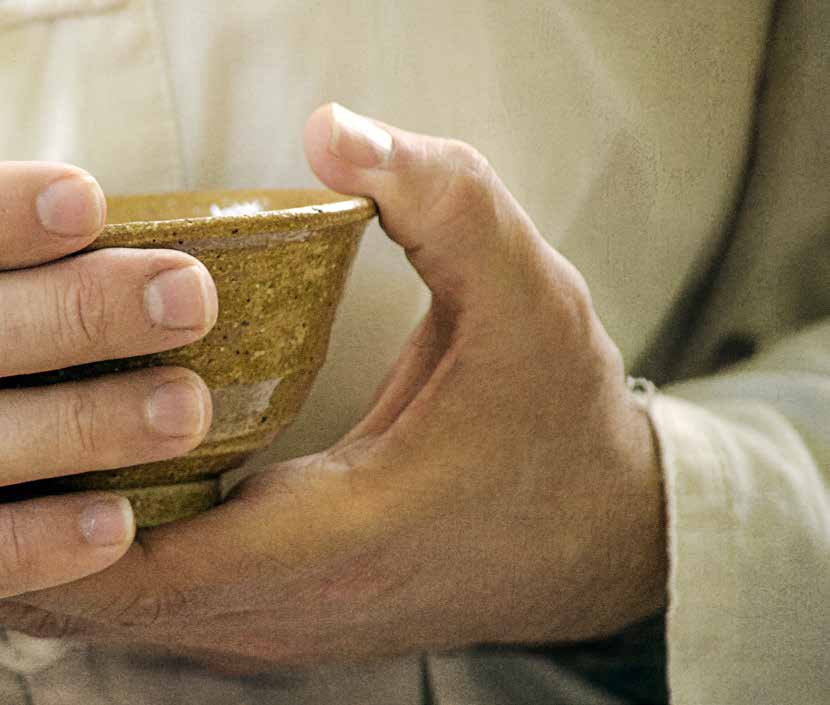
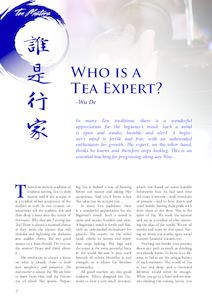 |
|
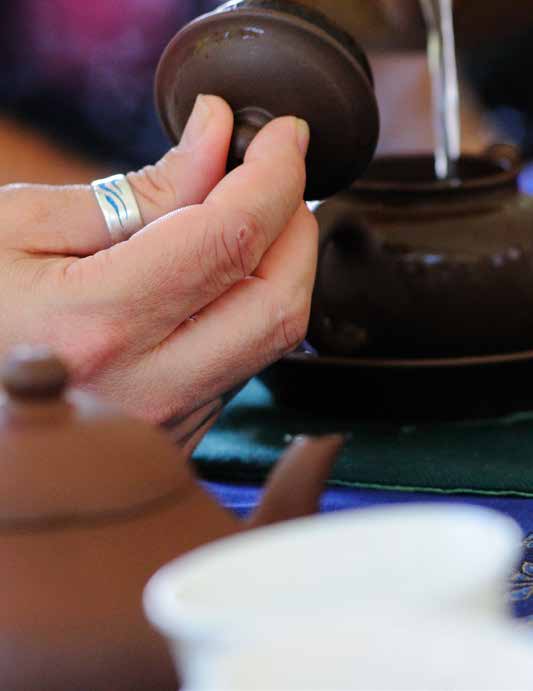
There is an ancient tradition of students serving Tea to their master, and if she accepts, it is a symbol of her acceptance of the student as well. In our courses, we sometimes tell the students this and then drop a koan into the center of the room: Why then am I serving you Tea? There is always a stunned silence as they await the answer that will thunder and lightning the darkness into sudden clarity, like any good answer to a koan should. Do you see the answer? Pause and think about it...
The resolution is always a focus on what is already there - a look into simplicity and presence: The real teacher is always Tea. We are here to learn from Her, and the Nature out of which She speaks. Preparing Tea is indeed a way of bowing before our master and asking Her acceptance. And you'll know when She takes you in, accepts you...
In many Zen traditions, there is a wonderful appreciation for the beginner's mind. Such a mind is open and awake, humble and alert. A beginner's mind is fertile and free, with an unbounded enthusiasm for growth. The expert, on the other hand, thinks he knows and therefore stops looking. The Sage said the ocean is the most powerful force in the world because it puts itself beneath all others. Humility is real strength, as it allows for limitless potentiality.
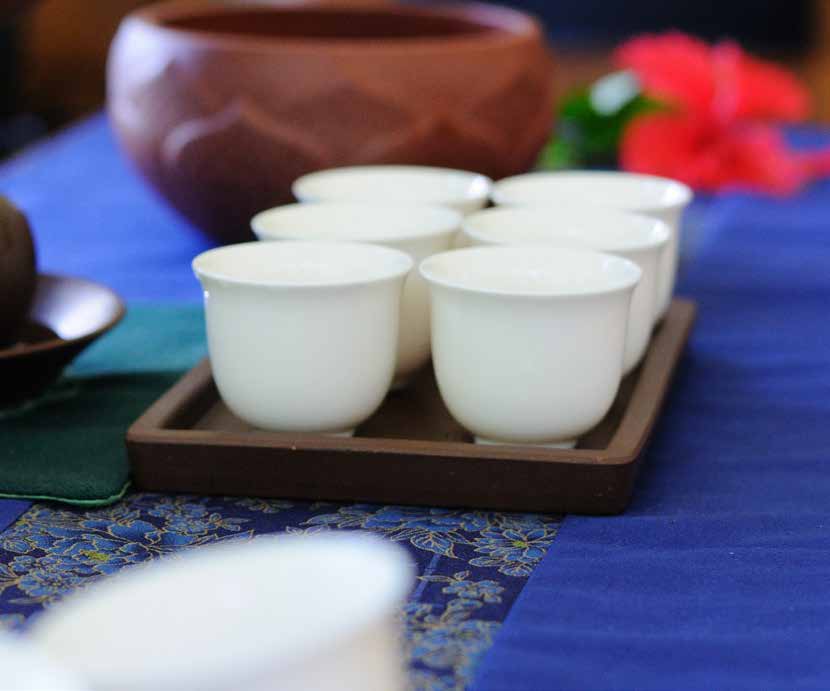
All good teachers are also good students. Rikyu designed his Tearoom to have a very small entrance, which was based on some humble fishermen's huts he had seen near the coast. Everyone - lord, merchant or peasant - had to bow down and crawl inside, leaving their pride with their shoes at the door. This is the spirit of Tea. We wash the teaware and tea as a symbol of this: removing the dust of the world. We are all monks and nuns in this space, having set down our masks, egos, social statuses, financial statuses, etc.
Nothing can hinder your journey down any path as much as thinking you already know. To know is to dismiss; to fail to see the unique beauty of each moment. The world of Tea is vast and deep, and a thousand lifetimes would never be enough. When you go to a farm and see masters shaking the oolong leaves, you may think it looks easy; but when you try it, you will realize just how difficult it is, and how long it would take to master. Does this make the farmer who has mastered such processing skills a Tea expert? Others write books on the history of Tea, or the kinds of Tea and their processing. Are they Tea experts? There are merchants that have learned a lot of information about Tea. They can satisfy your curiosity about most Tea matters in an amazing way. Are they Tea experts? And what about the monk, deep in the mountains? He has never processed Tea and doesn't have much Tea history or information, but he can brew Tea like no other. His hands move with a great calmness and fluidity that betray decades of practice and skill. Is he a Tea expert?
Actually, finding confidence and capability in any skill - including Tea - is only an intermediate stage. We start out so beautifully: with radiantly open eyes, full of fervor to learn more about Tea. Then we begin to learn some information and develop some skill in preparation. Perhaps we travel and learn about tea mountains, or even participate in some tea processing. This is all wonderful. We now have the ability to share tea with others. We can articulate our experiences and begin to travel deeper into Tea. Our Leaf begins to communicate to us and we start to embody the spirit of Tea. But mastery only begins when we come full circle and embrace the not-knowing. The difference between the innocence of the child and that of the master is vast, however. The child is pure and bright, but soon an ego will grow and the innocence will be lost. The master brings consciousness and awareness to innocence. He represents innocence that knows it's innocent. This is very much in harmony with our human purpose, our Dao. Nature has always been beautiful; it has always been serene. We bring awareness to this. Through us, Nature is beautiful and knows it's beautiful. Through us Nature is serene and knows it's serene.
Osho often said there are three kinds of fools in the world: the simple fools, who don't know and don't know that they don't know. They are ignorant. The complex fool is what we all become after years of education. The complex fool also doesn't know, but he thinks he does. The last kind of fool is the blessed fool, who knows that he doesn't know. In his words: "The blessed fool has the greatest possibility of understanding because he has come to know that knowledge is futile, he has come to know that all knowledge is a barrier to knowing. Knowledge is a barrier to knowing, so he drops all knowledge and becomes a pure knower. He simply attains to clarity of vision. His eyes are empty of theories and thoughts. His mind is no more a mind; his mind is just intelligence, pure intelligence. His mind is no longer cluttered with junk; his mind is no longer cluttered with borrowed knowledge. He is simply aware. He is a flame of awareness."
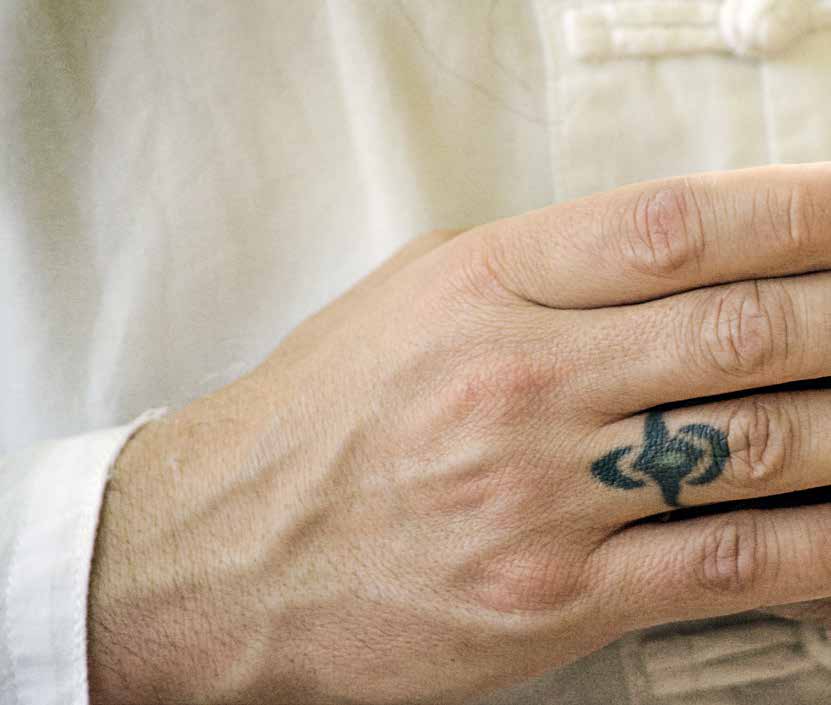
"In the beginner's mind there are many possibilities, but in the expert's there are few..."
After the intermediate stage, we return to a state where we don't need to show off anymore. We are as interested in learning as we are in sharing, and in learning from the sharing. The master no longer wants or needs to be an expert. Others may see her this way, but she definitely doesn't feel that way or live from that space. She rests in intelligence.
The Cha part of Cha Dao is the easy part. It's the Dao that is hard. And all the best teaware and tea information won't change people if it is prepared with pride. A simple bowl might leave a much greater and longer-lasting impression. This isn't to say that Tea information is useless. There is a lot to learn and enjoy in learning about teas, their history, where they come from and how they are made. But without Dao in equal measure, everything becomes expertise, everything becomes a competition. Which tea is better? Which is worse? Your brewing is better than hers, and hers is better than his. The comparative mind has its place, and discrimination definitely plays a role in our growth, but when it consumes us it leads to snobbery and we forget that the most important aspect of all Tea - from history to production, preparation to spirit - the greatest part of good Tea is heart!
Simple bowl tea prepared from out a pure heart will be wonderful, and we'll connect through it. The best teas prepared in condescension and pride will leave us separate, and often argumentative. After thousands of tea sessions, we find the ones with heart to be the most memorable, not the fanciest or most expensive.
The fact is that there are no Tea experts. Stay in a state of intelligence. Don't ever lose the passion for exploration and growth. Don't ever stop learning. In Japan, this practice is called "kaizen". Keep this word and its virtue with you always. Kaizen means that we remain students, choosing to learn something even on our last days alive. It means that we don't ever put boundaries around our limitless souls. There is infinite creativity and growth in us all. Never limit your own potential in Tea. Practice growing and learning. All situations are either teachers or teachings. The people we meet and the different teas we drink are here to teach us or to be teachings themselves. And even when we get to the point where we start teaching others, sharing our wisdom, there is still a great learning in that process.
Paradoxically, we can only achieve mastery of Tea when we let go of the desire to master anything. When we put ourselves beneath the Tea and bow down, it will flow into us. And then it will flow through us and help change others as well. In surrendering to our limitless growth, and wearing kaizen as a talisman near our hearts, Tea begins to find its way in through the cracks in our ego - prying them apart so that the light can shine through, the light of the world. And in that ancient starlight, we find the warmth of our true home...

